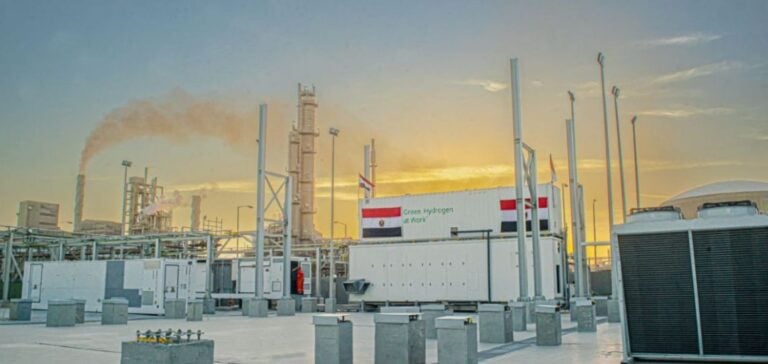Scatec ASA and Fertiglobe have reached a major milestone in Egypt’s green hydrogen project. This project, developed in partnership with Orascom Construction, the Sovereign Fund of Egypt and the Egyptian Electricity Transmission Company, aims to produce renewable hydrogen to power the production of green ammonia. The sales agreement was signed at the Egypt-EU Investment Conference in Ain Sokhna.
The project is based on the installation of a 100 MW electrolyser powered by 270 MW of solar and wind energy. Scatec has also invested in wind power in Egypt. The aim is to produce around 13,000 tonnes of renewable hydrogen and up to 74,000 tonnes of green ammonia annually. This initiative demonstrates Egypt’s ability to position itself in the global green energy market, thanks to its renewable resources and strategic geographical location.
Partners and Funding
Scatec, as lead developer with a 52% majority stake, will provide EPC services in collaboration with Orascom Construction. The project is supported by the European Bank for Reconstruction and Development (EBRD), the European Investment Bank (EIB), DEG (KfW), British International Investment (BII) and the US International Development Finance Corporation (DFC).
Final financing of the project is scheduled for the first half of 2025, enabling Egypt to become a regional hub for green hydrogen. The project is located in the Suez Canal Economic Zone (SCZONE), which aspires to become a major center for the green hydrogen industry.
Key elements of the project
The 20-year sales agreement for green ammonia is the result of the first H2Global tender won by Fertiglobe. This agreement marks a significant step forward in the development of the project and paves the way for large-scale commercial production. Crucial next steps include selecting the electrolyser supplier and completing the project financing process with international financial partners.
The Egypt Green Hydrogen project aims to provide competitive and sustainable energy solutions, helping to diversify the Egyptian economy and attract foreign direct investment in the energy sector. This development is in line with Egypt’s strategy of becoming a leader in renewable energies and green hydrogen.
Economic and strategic impact
The development of green hydrogen in Egypt represents a strategic investment in the country’s energy infrastructure. It creates job opportunities and stimulates local economic growth. By partnering with international companies and financial institutions, Egypt is strengthening its position in the global green energy market and diversifying its sources of revenue.
The 20-year agreement for green ammonia guarantees stable, long-term demand for the hydrogen produced, providing financial security for the partners involved. In addition, collaboration with entities such as the EBRD, the EIB and other financial institutions reinforces the credibility of the project and ensures competitive financing.
Partner declarations
Ahmed El-Hoshy, CEO of Fertiglobe, underlined that this agreement is a crucial step for the sustainable production of ammonia and the future development of the green hydrogen project in Egypt. EIB Vice-President Gelsomina Vigliotti highlighted the important role of green hydrogen in the global energy transition.
Monika Beck, Managing Director of DEG, expressed DEG’s mission to promote green hydrogen as a driver of economic transformation. Iain Macaulay of the BII underlined Egypt’s potential to become a world leader in the production of renewable energy and green hydrogen.
This green hydrogen project represents a significant step forward for Egypt, positioning the country as a major player in the renewable energies sector. With the support of international partners and competitive financing, Egypt is on the way to becoming a global hub for green hydrogen, stimulating the energy transition and sustainable development.






















